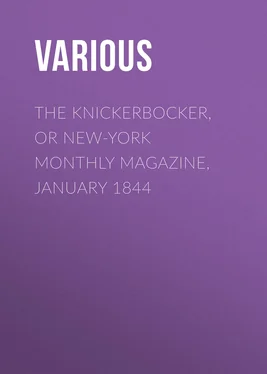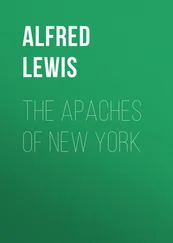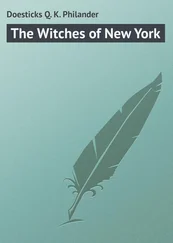Various - The Knickerbocker, or New-York Monthly Magazine, January 1844
Здесь есть возможность читать онлайн «Various - The Knickerbocker, or New-York Monthly Magazine, January 1844» — ознакомительный отрывок электронной книги совершенно бесплатно, а после прочтения отрывка купить полную версию. В некоторых случаях можно слушать аудио, скачать через торрент в формате fb2 и присутствует краткое содержание. Жанр: foreign_antique, periodic, foreign_edu, на английском языке. Описание произведения, (предисловие) а так же отзывы посетителей доступны на портале библиотеки ЛибКат.
- Название:The Knickerbocker, or New-York Monthly Magazine, January 1844
- Автор:
- Жанр:
- Год:неизвестен
- ISBN:нет данных
- Рейтинг книги:4 / 5. Голосов: 1
-
Избранное:Добавить в избранное
- Отзывы:
-
Ваша оценка:
- 80
- 1
- 2
- 3
- 4
- 5
The Knickerbocker, or New-York Monthly Magazine, January 1844: краткое содержание, описание и аннотация
Предлагаем к чтению аннотацию, описание, краткое содержание или предисловие (зависит от того, что написал сам автор книги «The Knickerbocker, or New-York Monthly Magazine, January 1844»). Если вы не нашли необходимую информацию о книге — напишите в комментариях, мы постараемся отыскать её.
The Knickerbocker, or New-York Monthly Magazine, January 1844 — читать онлайн ознакомительный отрывок
Ниже представлен текст книги, разбитый по страницам. Система сохранения места последней прочитанной страницы, позволяет с удобством читать онлайн бесплатно книгу «The Knickerbocker, or New-York Monthly Magazine, January 1844», без необходимости каждый раз заново искать на чём Вы остановились. Поставьте закладку, и сможете в любой момент перейти на страницу, на которой закончили чтение.
Интервал:
Закладка:
And Wine, that God hath sent to make glad the heart of man, and hath blessed it in the cup; and which might perhaps have had the same hilarious effect, though it were of the dingy colour of the ashes of the grate by which I sit; but which, for our more perfect happiness, He hath made to outvie the Topaz and the Ruby, in its lustre and its varied hue!
There are many of us who have this one quality, the love of colour, in common with the magnificent David, whose precious inspiration I have quoted at the head of my Essay, and who in a thousand passages interweaves it like a golden thread amid his works; but as in the minds of many others, it may be a blessing only half appreciated, I have thought that a few words upon this subject might fall not unfruitfully upon the heart, perchance of some one young Reader of this article, just opening to the knowledge of this peculiar work of the great Master of mankind, Colour.
Even Music, although itself an occupation revealed to us as of the Angels of Light, is, except perhaps as they enjoy it—with whom poetry and modulated sound adapted to the thought are inseparably one—even music is less refined, less gentle, perfect, unobtrusive. For the enjoyment of Colour involves no possible interruption of another’s tastes; no outbreak upon the quiet stillness of the day; no intrusion on ‘the ear of night;’ nor yet any expression, that by pouring abroad the sensations, might diminish the deep earnestness of the soul; which, all sight, all ear, becomes the Recipient. The enjoyment of colour is the Spirit within us listening to the language of God! to the mute expression of His unspeakable Love! Colour—the conception He hath chosen for His bow of promise in the Heavens! by which He decorates the Earth, and tells of Himself in the ocean, and in the sky, and by which He restoreth the Soul of man!
And in that state of celestial existence which attends the redeemed Soul disenthralled from ‘the body of this death,’ is it to be doubted, that among the joys that ‘the eye hath never seen, nor the heart conceived,’ there exist colours beautiful beyond all earthly wealth of imagination; beyond the poet’s fancy and the painter’s dream? There where the pure gold of which the city is constructed, is transparent as glass, and each gate is one pearl, and the very foundations of the walls are of jasper, and chalcedony, sapphire, emerald, ruby, amethyst and topaz; and the glory of God is the light that lightens it!
But it is not to another world that the joys of colour are postponed, nor even to another climate that we need look for the precious satisfaction that they impart. We have not the carpets of flowers of rainbow tints, that spread themselves over whole prairies of Texas and Mexico, but what a gem upon the bosom of Earth when it is unexpectedly found among us is the blue campanula! And the small white lily of the valley, sheltered and concealed in its green leaves like a hidden tear of Joy, and almost as rare! And the bright and graceful lobelia cardinalis that loves the neighbourhood of the still waters. And the fringed gentian of a tint so cerulean that our true poet derives it from the firmament; as his own spirit, if left to approach its kindred element, might claim affinity with the overshadowing expanse of celestial life! 3 3 This allusion is to Byrant’s lines ‘To the Fringed Gentian,’ a poem so replete with truth and beauty, that we cannot resist the inclination to quote it here. Ed. Knickerbocker. Thou blossom bright with autumn dew, And coloured with the heaven’s own blue. That openest, when the quiet light Succeeds the keen and frosty night. Thou comest not when violets lean O’er wandering brooks and springs unseen, Or columbines, in purple dressed, Nod o’er the ground-bird’s hidden nest. Thou waitest late, and com’st alone, When woods are bare and birds are flown, And frosts and shortening days portend The aged year is near his end. Then doth thy sweet and quiet eye Look through its fringes to the sky, Blue—blue—as if that sky let fall A flower from its cerulean wall. I would that thus, when I shall see The hour of death draw near to me, Hope, blossoming within my heart, May look to heaven as I depart.
I speak not to thee of the gorgeous sunsets and of those piles of massy clouds of living and ever-varying colours on which the Day pillows himself to rest in a luxurious repose; but open thine heart upon the Eastern bank of the Hudson at the grey of morning, and look with the Sun upon the opposite shore; and as the mists arise and are dispelled from before thee, there shall come change after change of colour neutral and calm and slowly warming into beauty, until a violet haze shall rest upon the hill-tops and the cliffs that might outvie the golden haze of Italy, and that shall raise thy thoughts in silent thankfulness, and educate thee to enjoy the untold treasuries of colour that glow in upper Heaven; and hope shall spring forth renewed within thee; and sorrow shall fade from thy widowed, or thy childless heart; the peace which passeth understanding shall come over thee; and God even thine own God shall bless thee; and to thine eyes, now opened to the wonders of His goodness, all the ends of the Earth shall shew forth
Конец ознакомительного фрагмента.
Текст предоставлен ООО «ЛитРес».
Прочитайте эту книгу целиком, на ЛитРес.
Безопасно оплатить книгу можно банковской картой Visa, MasterCard, Maestro, со счета мобильного телефона, с платежного терминала, в салоне МТС или Связной, через PayPal, WebMoney, Яндекс.Деньги, QIWI Кошелек, бонусными картами или другим удобным Вам способом.
1
Heures, prayers.
2
Float.
3
This allusion is to Byrant’s lines ‘To the Fringed Gentian,’ a poem so replete with truth and beauty, that we cannot resist the inclination to quote it here.
Ed. Knickerbocker.Thou blossom bright with autumn dew,
And coloured with the heaven’s own blue.
That openest, when the quiet light
Succeeds the keen and frosty night.
Thou comest not when violets lean
O’er wandering brooks and springs unseen,
Or columbines, in purple dressed,
Nod o’er the ground-bird’s hidden nest.
Thou waitest late, and com’st alone,
When woods are bare and birds are flown,
And frosts and shortening days portend
The aged year is near his end.
Then doth thy sweet and quiet eye
Look through its fringes to the sky,
Blue—blue—as if that sky let fall
A flower from its cerulean wall.
I would that thus, when I shall see
The hour of death draw near to me,
Hope, blossoming within my heart,
May look to heaven as I depart.
Интервал:
Закладка:
Похожие книги на «The Knickerbocker, or New-York Monthly Magazine, January 1844»
Представляем Вашему вниманию похожие книги на «The Knickerbocker, or New-York Monthly Magazine, January 1844» списком для выбора. Мы отобрали схожую по названию и смыслу литературу в надежде предоставить читателям больше вариантов отыскать новые, интересные, ещё непрочитанные произведения.
Обсуждение, отзывы о книге «The Knickerbocker, or New-York Monthly Magazine, January 1844» и просто собственные мнения читателей. Оставьте ваши комментарии, напишите, что Вы думаете о произведении, его смысле или главных героях. Укажите что конкретно понравилось, а что нет, и почему Вы так считаете.












